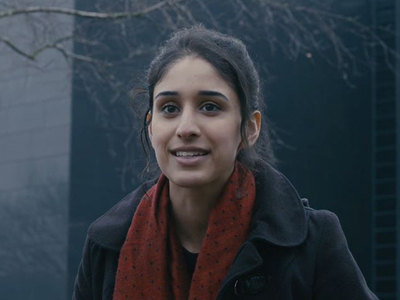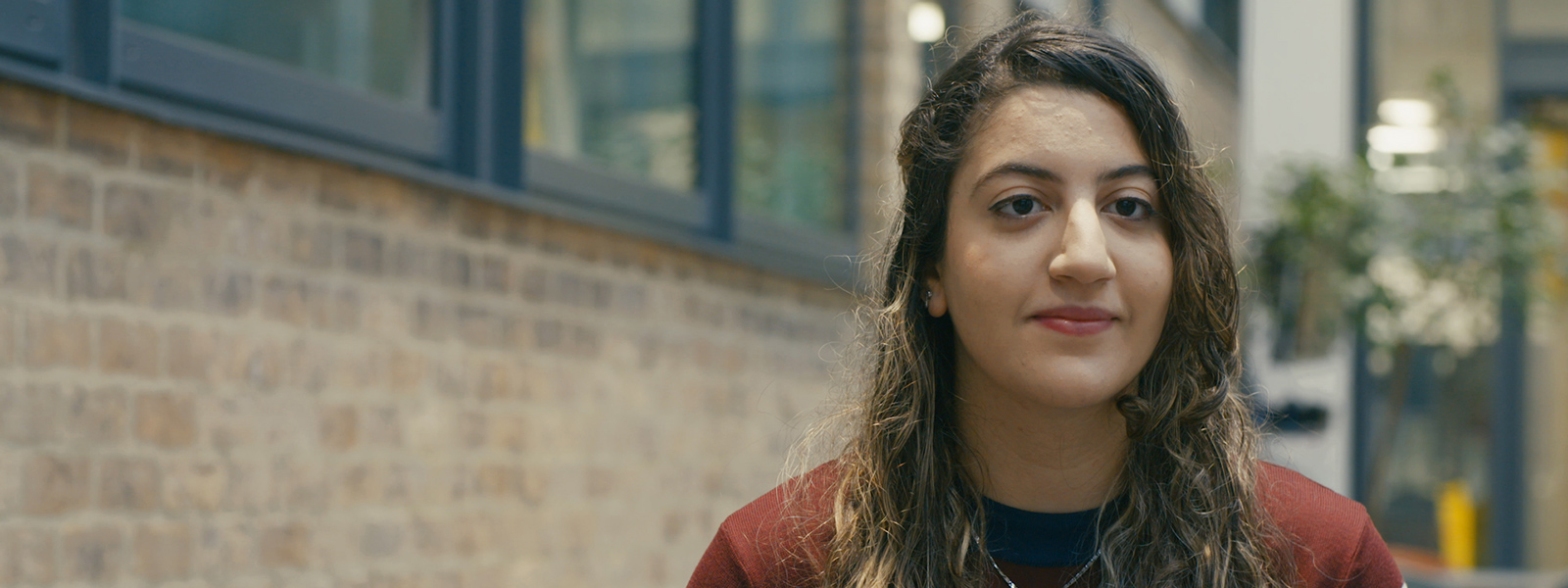
A supportive community
As one of the smallest medical schools in the UK, Lancaster Medical School offers more than just a degree: here you'll be supported by a true community. Read on to meet our students and find out why Sarah, Siraj, Salma, Dominic and Sukhbir chose to devote their lives to medicine.
Watch the full videoSarah
"Studying medicine means that I can make a difference in someone's life. When I was sixteen my Nana died - she had quite a serious neuromuscular disorder called Motor Neurone Disease, and she completely deteriorated near the end. I helped look after her, and I think for me that was the moment that I thought: yeah, that's what I want to do with my life."
"Because Lancaster Medical School is one of the smallest in the country you get to know people from all different years, meaning that even though it's a daunting experience, you get a lot of support from people who have been through what you're going through. That really does make a big difference. There's always someone that you can go and speak to if you're having a problem with any part of the course, and that's not just the university-based staff, but the people you meet in hospital as well. They are great at supporting you and they are always willing to teach, and keen to inspire the next generation.
"Last year I did a whole year on placement, two days a week, with half the year in Furness General in Barrow and half the year in Lancaster. Making the change from university-based learning to a more clinical setting has been been a great foundation for us - going from learning how the human body works right throughout first year to how it goes wrong all of a sudden. Now in third year I've gone onto doing different specialities and I've just finished my women and children placement, which is one of the best experiences I've ever had. I was involved with everything, every opportunity. I was in theatres, I was helping with Caesarean sections. It was such an incredible experience, seeing new lives being brought into the world, and it's an amazing thing to be part of.
"Being a doctor means that you get to be around people when they are at their most vulnerable, and having that trust between yourself and a patient is so rewarding. Hopefully that's something I can bring to the NHS - my ability to communicate really well with patients."

Siraj
"I'm constantly fascinated by the human body, how things can go wrong, and how treatment works. But my real motivation to study medicine came from a more personal connection: my parents grew up in an area where there wasn't a service like the NHS and they had to pay for all their facilities. The NHS provides a brilliant service and it's free here, which is a big blessing, so I've always been grateful for that and had the desire to give back."
"I've loved my time here at Lancaster; it's a real community feel. The Medical School isn't too big, so you get to know all the staff and all the students, and it's like a big family. It's a fantastic environment. We each have an academic advisor who we regularly meet with and so we can talk, ask questions or share concerns at any time. We get one-to-one teaching and we also get our own time to study, which is a good balance.
"In the second year we go into the hospital and have clinical contact with patients, and this is absolutely the best thing about medicine because you can really help people. This is what we've been waiting for. It gives me great pleasure to listen to someone - to their concerns, their worries about their health, or just life in general - and to say 'I can do something to help you'.
"I hope to bring change by excelling in my field, going as far as I can, contributing to research, spending my time in the NHS, raising concerns where I feel there's inequality and injustice, and helping to remove these barriers."
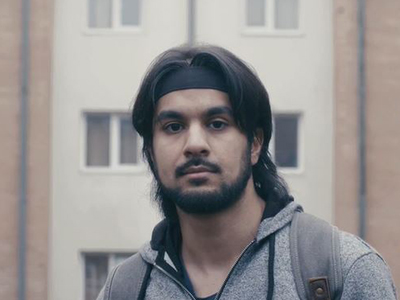
Salma
"One of the things that sparked my interest in medicine was my own experience of spending quite a bit of time in hospital. I got to see how doctors interacted with patients, and how they used communication to help patients feel better. Hopefully I can make a difference by making my patients feel comfortable, and making sure that they are always listened to. I just want to make sure that I'm a really responsible doctor, look after my patients and put them first."
"I'm currently in my third year at Lancaster Medical School and my experience here has been really great - I've had a lot of clinical experience, and I'm only in my third year. One of my favourite things about clinical placements is the interaction with patients. When you start it's natural to feel a bit scared because it's the first time you've been in that environment, but you've got a big team to support you. Interacting with patients just helps you build up your confidence, and it gives you an insight into what you'll be doing for the rest of your life.
"At Lancaster one of the main things that we learn about are health inequalities, and how we can tackle them as doctors. I think it's really important for us to ensure that we as doctors make sure that we care for patients equally, with no discrimination, and make sure that we provide the same level of care to everyone, no matter their background."
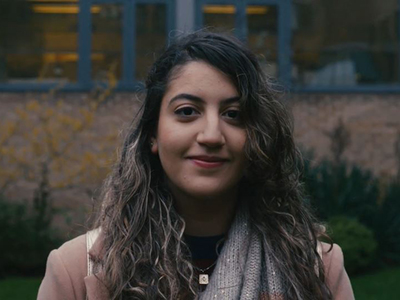
Dominic
"I'm continually humbled by my experiences on the wards, which is what made me realise that I really wanted to help people. Before this I'd wanted to do dentistry, but certainly medicine was the obvious choice for me. The holistic nature of medicine and the emotional aspect of patient care is what really made me choose medicine over other healthcare careers."
"Lancaster Medical School has a very good curriculum, and I chose it because of the year of clinical exposure. When I started my clinical placements interacting with different team members felt quite challenging, but throughout the years our clinical placement time increases and the boundary between me as a medical student and other healthcare professionals decreases. In Year Two we were mainly on the wards and for me that was an experience of developing my communication skills towards different age ranges, but it also enabled me to have insight into surgeries and different specialisms.
"I feel really well supported at Lancaster. There is a great sense of community between us fellow medical students throughout all the years, and everyone is approachable so I feel comfortable to going to other students to ask for help. And it's the same with staff - I've got no issues going to ask questions (even at the end of every session!) or to talk to them if I've got any concerns.
"Coming from quite a deprived area, I've seen that the people who don't seem to get healthcare seem to be those who need it the most, and I feel there's much work to be done to provide healthcare access for everyone. We need to change the strategy of how we tackle healthcare to make sure that we provide a service which is equal in opportunity to everyone. Learning more about health inequalities has opened my eyes to how disability can have a really negative impact on healthcare experiences, and Lancaster has done a good job of giving me an insight into disability and how I personally can create change as a future healthcare professional."
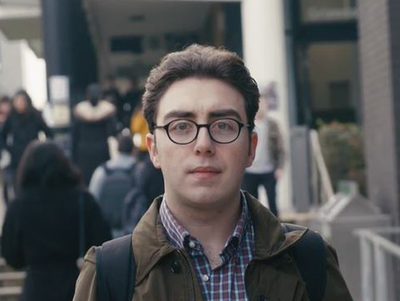
Sukhbir
"I have a passion for learning about the human body, but I also have a passion for working with people. If you take a look around the world there are people from all walks of life, from all backgrounds, all ages, and the thing that unites them all is their health and well-being. In the privilege of a doctor's position, you get to help them."
"My motivation for choosing to study medicine came from secondary school; the way that I grew up; the experiences I had. I took a lot of roles and responsibility in school, which I think shaped my personality and my skill set, and I think that's tailored to the skills that you need as a doctor. After I finished my GCSEs I started volunteering in care home, and it was then that I started to find myself as a person, finding my voice and growing a passion for helping people.
"I'm in my third year at Lancaster now and it's been a really great three years so far. It's one of the smallest medical schools in the UK but I think that is its biggest advantage because you get to know not only your peers, but your teachers, the staff, and the hospital really well on a one-to-one basis. So you've got a close community here at the university and another in the hospitals that you go to. Being on placement makes you realise that you're not alone as a doctor. There are people everywhere around you and you work together as a team, and they really make you feel welcome.
"The teaching style here is by problem-based learning (PBL) which I find extremely rewarding. You start with mostly PBL in Year One and then as you get to Year Two you get introduced to the hospital and the wards, so you start merging what you learn in a textbook with real life situations. You learn by examining a patient and taking histories from them, and I think that active learning style is a great thing about the course. You really develop the skills that you need once you've graduated. Importantly for me, Lancaster really puts an emphasis on learning not just about the human body but all the aspects around it. You learn about the psychology and the social aspects of a person, and you get to know them as a whole life, not just the symptom that they appear with. You focus on looking at a person holistically, treating everybody with respect, and welcoming the diverse community."
